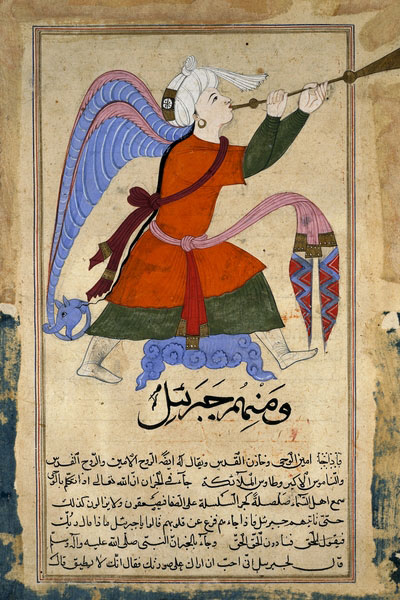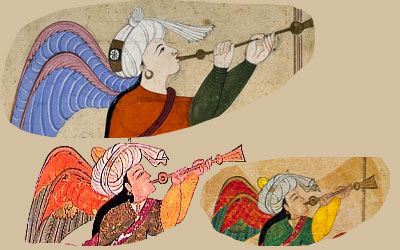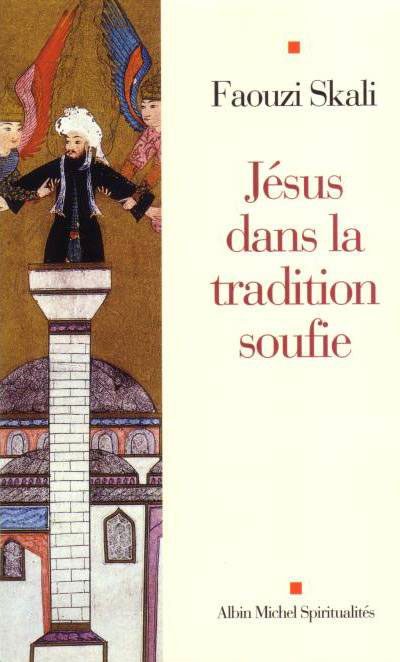After reading the atheistic Dawkins book (see
collateral damage), I thought it appropriate to read a book from the opposing theistic camp. The library was accommodating in presenting me with Francis S. Collins'
The Language of God (Free Press, 2006). This writer is earnest and at times quite sympathetic but he lacks the theatrical flair of Dawkins. Because he has a strong background and wide personal experiences in the areas he covers, his book is both informative and credible. However, there were several gaffes arising from what I perceive to be a shallow theism that matches Dawkins' shallow atheism.
The first most glaring gaffe occurs on page 41 [my emphasis]:
While the prophet Muhammad never himself used violence in responding to persecutors, Islamic jihads, dating to the earliest of his followers and including present-day violent attacks such as that of September 11, 2001, have created the false impression that the Islamic faith is intrinsically violent.
Never? Muhammad
never himself used violence? What has Collins been doing since Sep11? Surely not reading any of the discussion on violence in Islam. Definitely never venturing anywhere near
JihadWatch.org let alone
FaithFreedom.org,
AnsweringIslam.org, or other similar sites. If he had, he would know at least some of the following:
- In the initial phase of Mohammad's "prophetic" career, while he was in Mecca with but a few followers, he had no power or opportunity to use violence. He deserves no credit for that restraint.
- Shortly after being forced to leave Mecca and settle in Medina, Mohammad began to order (and also lead) raids against Quraysh caravans, killing the guards and stealing the loot from the camels' backs. He was thus a thief, an armed robber, and a murderer to boot. Details of the very first act of violence, a raid ordered against a caravan at Nakhla, are given in The earliest biography of Muhammad, by ibn Ishaq and also from page 97 of Robert Spencer's The Truth About Muhammad: Founder of the World's Most Intolerant Religion (Regnery Publishing, 2007). I will refer mainly to the latter resource for details as I have found Spencer to be reliable in his own reliance on original Muslim sources.
- These violent raids progressed to full-blown battle at Badr where victory for the Muslims was claimed as evidence of the "truth" of Islam. See Koran 8:8 - "That He might cause the Truth to triumph" - and surrounding verses.
- Following a victorious battle against a Jewish tribe, the Banu Quraysah, Mohammad ordered and supervised the massacre of all the men of the tribe. The women were distributed among his gang to be raped and, along with their children, taken as slaves. Details are given from page 128 of Spencer.
- Mohammad was happy to order the torture of a captive, simply to extract information on the whereabouts of treasure. For details, see page 140 of Spencer. Torture was used on other occasions with clearly little other than sadistic intent as, for example, detailed in a Bukhari hadith.
- Mohammad encouraged - or effectively ordered - the assassination of a Jewish poet guilty of composing "verses of an insulting nature". See page 115 of Spencer. There were several other similar incidents as listed at page 197 of Spencer.
- For me, Mohammad's greatest sin of violence was indirect, relating to his approval of his followers' murder of women guilty of "disparaging" him. Details and sources can be found at my hearing the breath post.
Any of the above victims of Mohammad's cruelty and brutality could be characterized as his "persecutors", people who criticized or opposed him. Once he had the means to do so, he pursued his goals on the basis of a "might is right" prescription, terrorizing and murdering without scruple and often with supposedly "divine" approval.
Perhaps Collins has not educated himself sufficiently to be aware of every gory detail of this saga but he should have become acquainted with at least one detail by now, sufficient at least to balk at the use of the word "never" in the passage quoted above. He comes across as a very very naive man indeed, as one who sees the world - and other faith traditions - through the rose-coloured glasses of Christian sentimentality. If he can get this much so wrong, what value can there be in the remainder of his views?
The most positive element of Collins' book is his forthright defense of Darwinian "truth" and the lucidly presented details gleaned from his own field of genetics. It was fascinating, for example, to learn how the apparent extra chromosome (24 total) of our nearest relative, the chimpanzee, appears to have fused with another chromosome to result in the lesser count (23 total) in humans. Everything falls into place as Darwin would have predicted it.
If Collins can influence a good number of his fellow theistic Americans then he will have done a good service to science and to evolutionary biology in particular.
However, on the side of religious "truth", he sounds to me as hollow as Dawkins. He does not use the aggressive arrogance of Dawkins but a softly-softly "Christian" approach, gently trying to persuade any atheistic audience of the reasonableness of his own position. However, at bottom, he really is but a Christian apologist. He really does, quite literally, believe in the unique godhead of Jesus Christ and in the miracle of His resurrection.
To be fair, however, Collins states his Christian beliefs in a special chapter providing a more personal perspective. In terms of a more universal "truth" he proposes a faith he terms BioLogos, which includes 6 points. The first 3 are summaries of what science has come to know of the age of the universe, its physical properties "precisely tuned for life", and the onset of evolution as a process leading to life's diversity and complexity. In the next 2 points, the divine is specifically excluded and our animal nature affirmed:
4. Once evolution got under way, no special supernatural intervention was required.
5. Humans are part of this process, sharing a common ancestor with the great apes.
All of the theistic "damage" occurs in the final point:
6. But humans are also unique in ways that defy evolutionary explanation and point to our spiritual nature. This includes the existence of the Moral Law (the knowledge of right and wrong) and the search for God that characterizes all human cultures throughout history.
For me, this still looks like a "god of the gaps" and an arbitrary place to introduce God. From my observation of plants, animals, and fellow humans, I see no good reason to make such a radical distinction between "us" and "them". I see as strong a sense of right and wrong in my cat as I do in my human neighbour (or myself) and I'm not sure the unfolding of a seed into a plant is
not a silent striving toward deity, a plant's version of "the search for God". Collins' BioLogos contains the same human arrogance as is present especially in the Judaically derived faiths, being all so influenced by the dreaded Book of Genesis.
Collins introduces the idea of the Moral Law much earlier in his book, in the chapter where he describes his own journey "From Atheism to Belief". It is in that section (on page 24) that he makes, ironically, a huge moral gaffe:
In some unusual cultures the law takes on surprising trappings - consider witch burning in seventeenth-century America. Yet when surveyed closely, these apparent aberrations can be seen to arise from strongly held but misguided conclusions about who or what is good or evil. If you firmly believed that a witch is the personification of evil on earth, an apostle of the devil himself, would it not seem justified to take such drastic action?
I will leave it to another reviewer to respond more fully to this and, at the same time, I would recommend Korthof's more detailed elaboration of problems with point 6 of BioLogos, similar to my own concerns stated but briefly above.
Shockingly, Collins highest priority is showing that witch burning does not invalidate the Moral Law and he does not bother to tell his readers that he is unconditionally against all torture of all human beings or against the death penalty. Or did he just forget to tell us? It should be easy to condemn an inhuman practice of more than 300 years ago. The 'aberration' seems to be that they burned the wrong people and that the Moral Law they tried to follow is good. The implication would be that Christians today more accurately know which people they have to burn. At the time they only got a few minor details wrong and executed 60,000 people. 'Some unusual cultures'? The European witch-hunt was not a single historical event, but took place from Scotland to Transylvania and from Spain to Finland over a 300-year period (1450 - 1750). Collins completely overlooks that witch burning is not an aberration of otherwise clear and sound concepts and principles. These poor individuals were charged with killing babies, causing sterility among cattle, and destroying crops by magical means, worship the Devil, and nocturnal flight (yes, the executors believed that witches can fly). An ordinary criminal could have been imprisoned or have a painless and quick death penalty. What is the harm done by witches to their neighbours? Does Collins think that magic works and that it has been proven by the inquisitors? Does Collins think that babies are killed and crops fail by magic? Does Collins think that the Devil exists and that 'the pact with the devil' has been proven in any case? Does Collins think that a 'firm belief' in stead of legal proof is enough to execute people in the cruellest way? The real aberration is in the abstract and fictional nature of the theological concepts such as 'witch', 'personification of evil', 'apostle of the devil'. There is the problem. There is the danger. Collins provides on these pages the best evidence of the dangers of fictional, abstract concepts so characteristic of religion. A closely related religious concept is eternal burning in hell. He completely fails to attempt a scientific analysis of this kind of thinking, instead he is part of the problem and he is completely carried away by abstract concepts himself.
from Gert Korthof's review of The Language of God (linked sources in the original)
Finally, near the end of the book, I found myself cringing at the arrogance of Collins' exclusive monotheism and two-faced "tolerance" of other faith traditions. First, on page 225, is the first face of his "tolerance" [with my own read-between-the-line additions]:
I do not mean by telling this story to evangelize or proselytize. [though that is, in fact, what I'm doing] Each person must carry out his or her own search for spiritual truth. If God is real, He will assist. [that man or woman to come to Him, that is, Christ] Far too much has been said by Christians about the exclusive club they inhabit. Tolerance is a virtue; intolerance is a vice. [and I so want to appear virtuous both to the reader and to myself] I find it deeply disturbing when believers in one faith tradition dismiss the spiritual experiences of others. [though I will do this myself in a few pages from here] Regrettably, Christians seem particularly prone to do this. Personally, I have found much to learn from and admire in other spiritual traditions, though I have found the special revelation of God's nature in Jesus Christ to be an essential component of my own faith.
Two pages later, on page 227, there is an about-turn followed by a final about-turn back to the initial "tolerant" face [my emphasis]:
Many of these [Golden Rule] principles can be found in other great religions of the world. Yet if faith is not just a cultural practice, but rather a search for absolute truth, we must not go so far as to commit the logical fallacy of saying that all conflicting points of view are equally true. Monotheism and polytheism cannot both be right. Through my own search, Christianity has provided for me that special ring of eternal truth. But you must conduct your own search.
Well, mate, I have conducted my own search and let me tell you this: Why can't there be different doorways to deity? Different approaches that suit different people? Many of the great mystics have exclaimed that God (or nirvana or the Tao) transcends all of our human intellectual categories
including the apparently opposing ideas that God is One and that It is Many. Maybe God is indeed "above" your petty distinction between monotheism and polytheism. Isn't it possible that Unity and Multiplicity are two paradoxical aspects of God just as light sometimes seems wave-like and sometimes matter-like? James Hillman, an advocate of polytheistic psychology (see my
Kali Xronia post for some background), contends that it includes non-exclusive (though not exclusive) monotheism. Some people may be more suited to a monotheistic approach, others to a polytheistic. Making dogmatic pseudo-logical assertions may not be helpful when facing a mystery as deep as deity.
Dawkins likes the propagandist motto that "atheists are bright" and I would have to agree with him that Collins does not deserve the label, at least when it comes to theology. He is "bright" when it comes to genetic science and so also is Dawkins when it comes to evolutionary biology. But both men are equally dumb on deity.
Labels: BioLogos, Christianity, Dawkins, evolution, Mohammad











